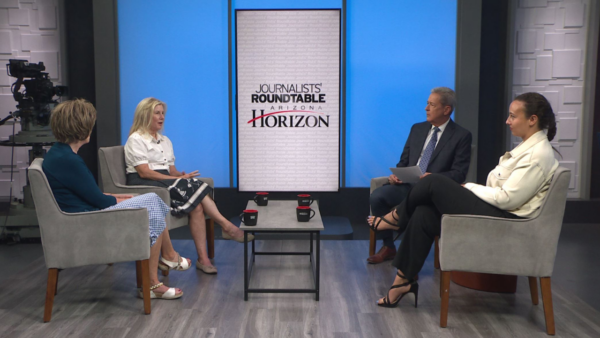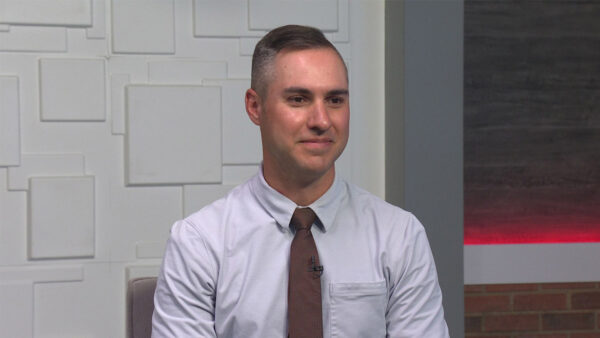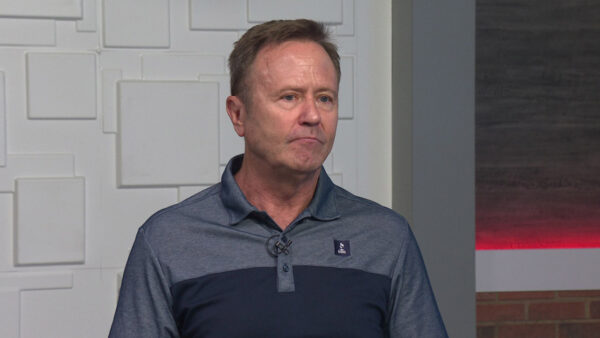The Phoenix Committee on Foreign Relations will present its 10th annual International State of the State October 27th. Panelists will look at Arizona’s place in international trade compared to other states and NAFTA partners. While the nation’s exports increased 23 percent over a five-year period, Arizona’s have declined two percent. Keith Galbut, the Chairman of the Phoenix Committee on Foreign Relations and Steven Beschloss, an award-winning writer, journalist and filmmaker, will discuss Arizona’s international trade picture.
Ted Simons: Good evening, and welcome to "Arizona Horizon," I'm Ted Simons. The Phoenix Committee on Foreign Relations will present its 10th annual international state of the state on October 27th. Panelists will discuss a variety of trade-related issues including numbers showing Arizona's international trade in decline while the U.S. rates are increasing. We have with us Keith Galbut, the chairman of the Phoenix Committee on Foreign Relations and Steven Beschloss, and award-winning writer, journalist and filmmaker. Arizona's place in international trade, where are we?
Keith Galbut: We have a lot of work to do. We've been making progress over the years. Of course, Arizona has a long history of strong international trade and relationships. But we're falling behind and there's a lot more work to do for us to maintain par and really get ahead. For example, in the metro Phoenix area, which is the sixth largest city in the country, we are ranked 27th as it relates to export trade so there's a lot of work to be done.
Steven Beschloss: That's below San Antonio, below San Diego, below El Paso and Greenville, South Carolina, and Peoria, Illinois. It underscores the fact that Arizona has been overly dependent on tourism and real estate and the kind of things that don't actually drive the growth of the state.
Ted Simons: Is that the reason, dependence on things other than exporting out of the country?
Steven Beschloss: I think historically there has been an overdependence on a small number of industries to drive Arizona's progress. It's clear that that has to change. If you go back to 2008 we really haven't even gotten back to that level since the great recession. We're still trying to get back to where we were then. At a national level, the country is at a record high in terms of its overall exports.
Keith Galbut: Ted, as well, we in Arizona often have short memories as it relates to recessions. During the period, we think about taking steps towards diversifying our economy. As the recession generally closes and we start to lift out of it, we forget. One of the problems with the great recession is this period has been much longer than normal. So it put a punctuation on the need for us to diversify our economy more broadly.
Ted Simons: You mentioned that Arizona has a rich history as far as international trade is concerned. What were we doing then that we may not be doing now? Greenville, South Carolina, what are they doing that we are not doing now?
Keith Galbut: My view is that there's a greater level of collaboration among the private sector and public sector leadership, aimed in a very direct and specific way at enhancing international trade. There needs to be a much greater level of enthusiasm. It really helps to create jobs and helps us to advance our community, and to even out these ups and downs we experience during recessionary and expansionary times.
Ted Simons: We have another country right at our doorstep, why aren't we more enthusiastic?
Steven Beschloss: Mexico represents an extraordinary asset for Arizona's growth. It already represents one third of our total exports and even a little more than that. You have major automakers from around the world spending billions investing in the growth of their industries. They recognize opportunities that exist there. We're still just kind of getting there. There's been a bump because you have the commitment on the part of the City of Phoenix, and others open an office in Mexico City. Then you have Mexico now committing to opening an office in Phoenix. So these things, they help, they start to move the needle. But as Keith was saying, it's so important to have groups focused on kind of global development, who are giving people the tools they need to do more exporting.
Ted Simons: What are some of those tools? What should be happening out there?
Keith Galbut: I think on the theme of what is happening and how can things get better, in the last 10 years there's been a very substantial effort put in place, an enhanced level of leadership to further international business. The efforts of the Greater Phoenix economic council, commerce authority, groups like global chamber, and regional groups focusing on regional growth and Canadian growth are very, very helpful for advancing those relationships. There is really a momentum. In my view that momentum is really important because it gets people together to talk about opportunities, and then people seize upon those opportunities and expand.
Steven Beschloss: And by the way, that's why the Phoenix Committee on Foreign Relations in the last few years has really started to focus more on how to bring people together to have those conversations. Not only to talk about general global issues but to really dig in and focus on what are the ways we can begin to move the needle. Partly it's a matter of building relationships. It sounds like maybe a light thing to say. If you want to start doing business in Malaysia, it helps if somebody can give you an introduction. It's data, being able to go to those markets and have an introduction that allows you to function successfully.
Ted Simons: Arizona's exports are from small and medium sized firms. Is that a good thing - is that a healthy thing?
Keith Galbut: I think it's a great thing. Phoenix has always been about entrepreneurism, we're not a major headquarters for large companies or even medium headquarters. Enterprises are entrepreneurial and interested in expanding and so being that, that is in fact the statistic that, 87% are from small and medium sized companies, we should really focus on that segment of the market to really expand. This correlates to employment, as well. Trade-related employment grows at four times the average of nontrade related employment. When we think about the small and medium sized businesses within our community, if we can turbocharge that effort it can make a big difference.
Ted Simons: And again, aerospace, computer electronics, transportation equipment was No. 2, minerals and ores No. 3. Could we get a little more diversified?
Steven Beschloss: Diversification is important to the whole conversation, not being dependent on a few things that a semiconductor company may be up one year and down the next year. Same with aerospace and the military. Right now we're saying if we have 7,000 businesses, that 87.5% that are operating outside of Arizona that are recognizing the opportunities, that's great. But the question is how do you get them to do more, how do you get them to focus on markets they haven't looked at and make a more significant commitment to it.
Keith Galbut: And in large part, that's what we're working on doing this coming Monday at the international state of the state. This is our 10th annual state of the state and we're focusing on international trade, bringing together the minds of education, Larry Penley is going to be moderating, President of Thunderbird, and representatives from the chamber of commerce and from the United kingdom, the Consul General is going to be there as well, to try to bridge this connectivity to turbocharge these needs.
Ted Simons: I'm an elected official. Tell me why I should really pay attention to this, why this is a big deal.
Keith Galbut: Well, my initial answer and most important, I think view is about jobs. It's about increasing our economy and doing it in a very healthy way, to create opportunities that currently don't exist or that we currently don't pursue. If we are really able to focus on that it can make a big difference.
Ted Simons: Again, I'm an elected official, I hear about exports, pitch me.
Steven Beschloss: Do you want to have one term in office or would you like to have more? The more diversified your economy is, which export trade can help you to smooth that out, then you have a better chance of not just winning when things are going well and not doing so well when things are going poorly.
Ted Simons: When is the event again?
Keith Galbut: Monday, a luncheon at the Ritz Carleton in Phoenix on Camelback. More information can be found a pcfraz.org, The Phoenix Committee on Foreign Relations.
Ted Simons: Good to have you here.
Steven Beschloss: Thank you very much.
Keith Galbut:Chairman, Phoenix Committee on Foreign Relations; Steven Beschloss:Writer, Journalist and Filmmaker;























